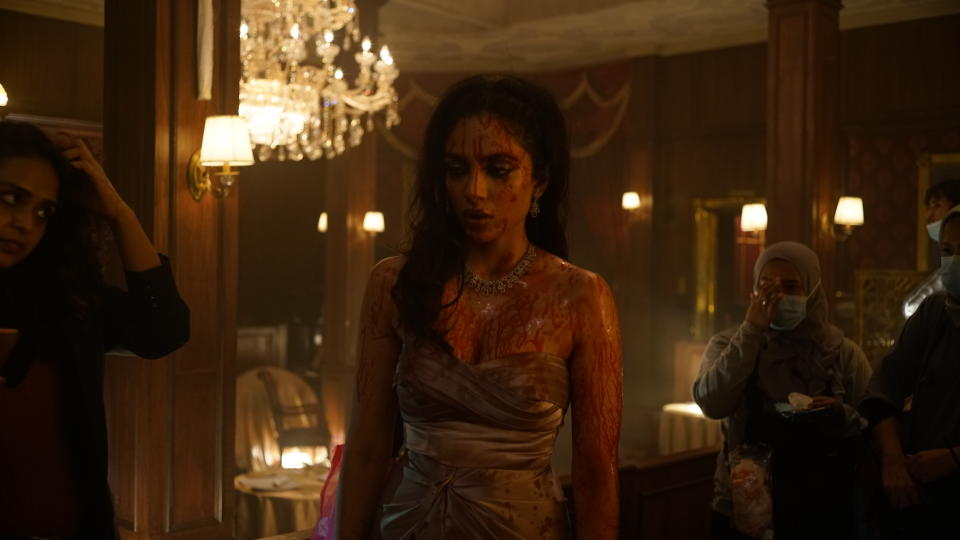‘Monkey Man’ Star Sobhita Dhulipala On Being “Accountable” As An Actor & How Dev Patel’s Directorial Debut Changed Her Life

“I’ve felt that being called ‘niche’ is a compliment, actually,” Monkey Man star Sobhita Dhulipala tells Deadline.
It is nighttime in India when we catch up with the star, and we are discussing a recent profile that dubbed her a “niche Indian actress.”
More from Deadline
“In India, there’s the conventional idea of a mainstream commercial film star where they love you because you entertain and give them escape, but you’re not really accountable as an actor to stand for anything,” she explains. “I guess my expectation from a different kind of actor who does films that reach my heart and travel with me would be somehow more personal, and that is a bit of a niche.”
Dhulipala’s choice of roles has reflected this mentality. Born in the South Indian state of Andhra Pradesh, she followed the career pipeline that takes a person from beauty pageants to acting, a path trodden by Priyanka Chopra, Aishwarya Rai and more. She left a degree in corporate law to represent India in Miss Earth 2013, and went on to make her acting debut in acclaimed director Anurag Kashyap’s psychological crime thriller Raman Raghav 2.0.
“I feel like I’ve been seen as someone who’s more ‘alternative’, for the lack of a better word,” says Dhulipala, using air quotes around the world ‘alternative.’
Although she has appeared in several Telugu, Malayalam and Tamil films, her most well-known role before Monkey Man was arguably as wedding planner Tara Khanna in Prime’s Video’s Made In Heaven. The vengeful, sometimes conniving and selfish character is not particularly likeable but over the course of three seasons she becomes one to root for.
‘Monkey Man’

Even before these roles came about, Dhulipala had auditioned to be Sita in Monkey Man, a first-time directorial venture for Slumdog Millionaire star Dev Patel. After an extensive audition process, she got the role in 2019, and the project filmed during lockdown on an island in Indonesia. Co-produced by Jordan Peele, the film took another four years to release worldwide.
A neo-noir action thriller starring Patel, which has so far taken more than $30 million at the global Box Office, Universal’s Monkey Man follows protagonist Kid, whose community is attacked when he is a child. Inspired by tales of Hindu monkey god Hanuman, he sets out to protect the disadvantaged and exact revenge. Dhulipala plays a relatively small but crucial role as a prostitute exploited in the brothel where Kid eventually works. Patel has previously said that Dhulipala, aside from being “breathtakingly beautiful,” also “carries pain well as a performer.”
Dhulipala waxes lyrical when asked whether Monkey Man changed her life. “Would it release at all? Where? Who would release it? I had no idea it would someday be birthed in such a beautiful way,” she says. “I get to go to the Chinese theater and SXSW with my film, it’s like the [John Lennon] song, right? Life is what happens to you while you’re busy making other plans.”
The global attention is somewhat new for Dhulipala, who describes herself as an introvert, comfortable “living under a rock because it’s moist and cozy”. “Often my response to social life is to sort of withdraw, so when I have to speak about myself or my journey, I’m just like, ‘Uh, so I’ve been alive, and um, I got typhoid last year, I don’t know’.” she laughs. “Do I have anything special to add?”
In an era where streaming has brought country-specific actors increasingly into the Hollywood spotlight, Dhulipala’s journey has been slightly different from predecessors like Priyanka Chopra and Deepika Padukone. For one, she has worked across multiple Indian film industries, not just Bollywood. She recalls a panel discussion with her co-stars from the Hindi adaptations of The Night Manager. The moderator had asked a question subtly alluding to the fact that she was South Indian but working in the North Indian Bollywood industry. “I think the host was just being cheeky, but I don’t know – when I go to another country, I’m Indian. When I’m in India, I’m South Indian. Within South India I don’t speak Malayalam or Tamil, I speak Telugu. But then again I’m not from Telangana, I’m from Andhra Pradesh,” she says, zooming in on regional specificities.
“Where do I get to be human? Maybe in a lab,” she adds.
Dhulipala’s frustrations sound very similar to those previously expressed by her co-star Patel, who was born in the UK to Indian parents who were themselves born in Kenya. In a 2021 interview with The Guardian about typecasting and representation, Patel said: “Where am I allowed to exist? How specific are we going to get with this? What does it mean to be an actor — to just be yourself? Am I only allowed to play a guy who’s 31 years old? Are you going to check my blood type?”
Dhulipala also rails against stereotypes. “When people say ‘India’ they usually think ‘tandoori’ and ‘balle balle’,” she says, referring to the lively songs and dances from the Punjab region. “But there’s such a beautiful density of culture, so if anyone asks me about India, I’m just going to say, ‘Do you have 15 minutes? Cause yeah, it’s a lot, here’s the full Chat GPT-style lowdown’.”
Though a self-confessed introvert, the fact that she has worked in multiple film industries has eased the transition into Hollywood. This proved useful on the set of Monkey Man, which saw more than its fair share of chaos. Patel shared in a Reddit post that filming during Covid-19 was an “absolute catastrophe” every day, with broken bones, bubbles and closed borders becoming the norm on set. “I think they were accomplishing five days of work on one day, every day,” recalls Dhulipala. “And we were eating the same food for months on end.”
“We didn’t even know if anyone would want to buy it, so it was a mad, beautiful energy that was just focused on the doing.”
Though set in an Indian context, Dev Patel’s directorial labour of love has yet to see a release in the country, coming as industry eyebrows are raised over a number of other delayed Bollywood releases. Many have theorized this is because the film is critical of the nationalist sentiment championed by the current government, but Dhulipala is coy. “It’s very perspective driven, right?” she says. “I could be put off by something which is totally normal to you and you think I’m overreacting and vice versa.”
She adds: “I feel like it’s very, very subject to someone’s personal belief system and their judgment, and who that person is, who the people are and who is assessing the release. It’s on them, I’m just small fry.”
This sentiment, summarized so neatly by Dhulipala, feels part and parcel of being a niche actor.
Best of Deadline
Step & Repeat Gallery: The Best Red Carpet & Party Photos Of 2024
2024 Premiere Dates For New & Returning Series On Broadcast, Cable & Streaming
Hollywood & Media Deaths In 2024: Photo Gallery & Obituaries
Sign up for Deadline's Newsletter. For the latest news, follow us on Facebook, Twitter, and Instagram.

